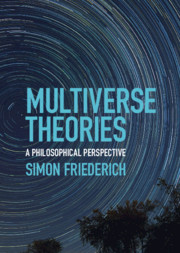Book contents
- Frontmatter
- Dedication
- Contents
- Preface
- Part I Setting the Stage
- Part II Fine-Tuning for Life and the Multiverse
- 4 The Standard Fine-Tuning Argument for the Multiverse
- 5 Problems with Priors
- 6 A New Fine-Tuning Argument for the Multiverse
- Part III Testing Multiverse Theories
- Part IV Wider Still andWilder
- References
- Author Index
- Subject Index
5 - Problems with Priors
from Part II - Fine-Tuning for Life and the Multiverse
Published online by Cambridge University Press: 07 January 2021
- Frontmatter
- Dedication
- Contents
- Preface
- Part I Setting the Stage
- Part II Fine-Tuning for Life and the Multiverse
- 4 The Standard Fine-Tuning Argument for the Multiverse
- 5 Problems with Priors
- 6 A New Fine-Tuning Argument for the Multiverse
- Part III Testing Multiverse Theories
- Part IV Wider Still andWilder
- References
- Author Index
- Subject Index
Summary
This chapter continues the discussion of the standard fine-tuning argument for the multiverse, switching to the language of Bayesianism. After highlighting the desideratum of motivating a non-negligible (ur-) prior for the multiverse, I assess a worry, due to Cory Juhl, about belief in the multiverse, as based on the standard fine-tuning argument for the multiverse: that, even if the inverse gambler's fallacy charge could be rebutted, such belief would inevitably rely on illegitimate double-counting of the fine-tuning evidence. I argue that this concern can be assuaged, at least in principle: it is coherently possible for there be empirical evidence in favor of some specific multiverse theory – and thereby, derivatively, for the generalized multiverse hypothesis – whose evidential impact is independent of the fine-tuning considerations. The probabilistic formalism is also used to clarify why it is so difficult to determine whether the standard fine-tuning argument for the multiverse is fallacious: the difficulty can be linked to an ambiguity in the background knowledge based on which the impact of the finding that the conditions are right for life in our universe is assessed.
Keywords
- Type
- Chapter
- Information
- Multiverse TheoriesA Philosophical Perspective, pp. 72 - 84Publisher: Cambridge University PressPrint publication year: 2021

